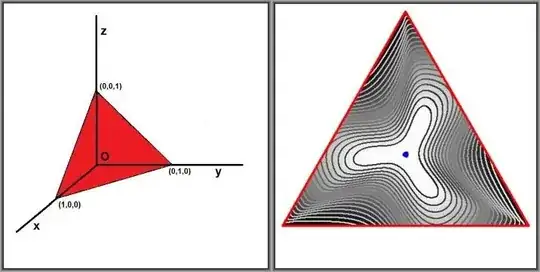Setting $a\rightarrow x^{1/3}$, $b\rightarrow y^{1/3}$, $c\rightarrow z^{1/3}$, the inequlity we want to show reduces to:
Show for any $x,y,z>0$
$$
\sum_{cyc}\frac{x}{(x+y)^{3/4}}\geq 2^{-3/4}\left(x^{1/4}+y^{1/4}+z^{1/4}\right).\tag 1
$$
We set
$$
x=\frac{b_1+c_1-a_1}{2}\textrm{, }y=\frac{c_1+a_1-b_1}{2}\textrm{, }z=\frac{a_1+b_1-c_1}{2},
$$
where $a_1,b_1,c_1>0$ are the sides of a triangle and (1) becomes equivalent to
$$
\sum_{cyc}\frac{\tau-a_1}{a_1^{3/4}}\geq 2^{-3/4}\left(\sum_{cyc}(\tau-a_1)^{1/4}\right),\tag 2
$$
where $\tau=\frac{a_1+b_1+c_1}{2}$. Hence equivalent we rewrite (2) in the form:
$$
\left(\sum_{cyc}a_1\right)\left(\sum_{cyc}a_1^{-3/4}\right)-\left(\sum_{cyc}a_1^{1/4}\right)\geq \sum_{cyc}\left(a_1^{1/4}+(2\tau-2a_1)^{1/4}\right).
$$
But from the "classical" inequality
$$
x^{1/4}+y^{1/4}\leq 2^{3/4}\left(x+y\right)^{1/4}\textrm{, }\forall x,y>0,
$$
we have (using that in every triangle we have $2\tau-2a_1$, $2\tau-2b_1$, $2\tau-2c_1>0$):
$$
\sum_{cyc}a_1^{1/4}+\sum_{cyc}(2\tau-2a_1)^{1/4}\leq 2^{3/4} \sum_{cyc}(a_1+b_1)^{1/4}.
$$
Hence if we manage to show that
$$
2^{3/4}\sum_{cyc}\left(a_1+b_1\right)^{1/4}+\sum_{cyc}a_1^{1/4}\leq\left(\sum_{cyc} a_1\right)\left(\sum_{cyc}a_1^{-3/4}\right)
$$
we are done.
For this we use the Minkowski inequality:
If $n\in\{1,2,3,\ldots\}$ and $x_i,y_i\in\textbf{R}^{*}_{+}$, $k\in\textbf{R}^{*}_{+}$, then
$$
\left[(x_1+y_1)^k+(x_2+y_2)^k+(x_3+y_3)^k\right]^{n-1}\leq
$$
$$
\leq (x_1^k+x_2^k+x_3^k)^{n-1}+(y_1^k+y_2^k+y_3^k)^{n-1}
$$
with equality when $\frac{x_1}{y_1}=\frac{x_2}{y_2}=\frac{x_3}{y_3}$.
We have (with $k=1/4$ and $n=5$):
$$
2^{3/4}\left((a_1+b_1)^{1/4}+(b_1+c_1)^{1/4}+(c_1+a_1)^{1/4}\right)\leq
$$
$$
\leq 2^{3/4}\left[\left(a_1^{1/4}+b_1^{1/4}+c_1^{1/4}\right)^{n-1}+\left(b_1^{1/4}+c_1^{1/4}+a_1^{1/4}\right)^{n-1}\right]^{\frac{1}{n-1}}=
$$
$$
=2\sum_{cyc}a_1^{1/4}.
$$
From this it is clear that we only have to show:
$$
3\sum_{cyc}a_1^{1/4}\leq\left(\sum_{cyc}a_1\right)\left(\sum_{cyc}a_1^{-3/4}\right),\tag 3
$$
Which looks like Chebyshev inequality, but it is not.
A more general inequality of this kind is:
$$
3(x^{k-l}+y^{k-l}+z^{k-l})\leq (x^k+y^k+z^k)(x^{-l}+y^{-l}+z^{-l}),\tag 4
$$
where $x,y,z>0$ and $k>0$, $l>0$ and it is quite easy to prove. i.e.
$$
3(x^{k-l}+y^{k-l}+z^{k-l})\leq (x^k+y^k+z^k)(x^{-l}+y^{-l}+z^{-l})\Leftrightarrow
$$
$$
2(x^{k-l}+y^{k-l}+z^{k-l})\leq (x^ky^{-l}+x^{-l}y^{k}+y^kz^{-l}+y^{-l}z^{k}+z^kx^{-l}+z^{-l}x^{k}).
$$
But
$$
x^{k-l}+y^{k-l}\leq x^{k}y^{-l}+y^{k}x^{-l}\Leftrightarrow
$$
$$
x^{k}(x^{-l}-y^{-l})-y^{k}(-y^{-l}+x^{-l})\leq 0\Leftrightarrow
$$
$$
(x^k-y^k)(x^{-l}-y^{-l})\leq0
$$
This last inequality is true for all $x,y>0$ and $k,l>0$. Gathering the other two inequalities involving $y,z$ and $z,x$, we get that (4) is true. Hence we get the validity of (3). QED
